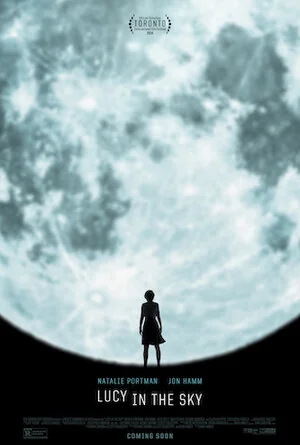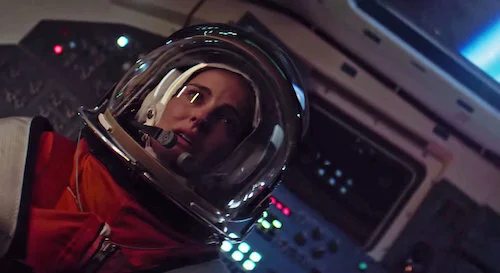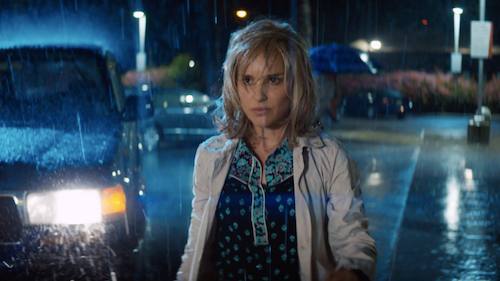Lucy in the Sky
Editor’s Warning: This is a review of a film shown at the Toronto International Film Festival. There is a chance that this film will not be accessible for a specific period of time, depending on the film’s release date. Be aware that there may be slight spoilers. Proceed at your own discretion.
The good news is that Noah Hawley's debut feature film Lucy in the Sky is a technical treat. First off, the film is a complete exercise in aspect ratio switching. You go from a square 1:1 to the widest of wide shots in the matter of seconds. For any aspiring filmmaker, this kind of juxtaposition is something to truly gawk at. The reason for all of this? Well, the film is based on the trash mag headlines that surrounded astronaut Lisa Nowak when she experienced mental illnesses after arriving back on Earth. These ratios are one new, creative way of experiencing disorientation in an everyday world (or everyday in the life of an astronaut).
The cinematography is sensational. A big theme of the film is how Hawley tries to make Lisa (well, Lucy in this film) experience space on Earth. Walls shimmer in her eyes as if she's staring at the sun. Stars float behind her, created from various forms of debris. Visually, and I can't believe I'm saying this, I could make comparisons between Lucy in the Sky and Shane Carruth's Upstream Color. Yeah. Visually, the film is a powerhouse. Then there's the score by Tonic legend Jeff Russo. When the film isn't being slapped on the back by more out of place music choices, Russo's general score is a tension building cyclone. Amongst every aesthetic asset, expect Lucy to be a feast of the year.
Now, having said that, Lucy is very much like its title character, with how much it buckles underneath its own expectations of self. The screenplay is very switched on with its dialogue, but the pacing is a little questionable. Certain plot threads are so quickly rushed along, it almost feels unnatural. The main example of this is the storyline where Lucy has an affair with a fellow astronaut. It gets into the nitty gritty parts of the storyline so quickly, you'll be more surprised that it arrives when it does than the fact it happens at all (it's pretty obvious after all).
The majority of Lucy is astonishing to look at, which certainly helps you bypass some of the narrative hiccups.
For every funny or moving line, there's a pacing issue. This all boils down to the blistering finale, where the screenplay holds the sequence back enough to not let it go fully shocking (when it has every right to be). Considering that this film is only briefly inspired by Lisa Nowak, I wish the film did more in some aspects. When Lucy drops everything, I wish it made more narrative sense. When she slowly drifts away mentally, I wish we felt it more. An audience member during the world premier's Q&A likened Lucy to another Natalie Portman character: Nina Sayers in Black Swan. That comparison is fairly strong, especially considering both are female perfectionists trying not to be replaced by fellow women in a field dictated by men that love to fuel fires. However, Black Swan's descent into madness is so gradual, you'll not even realize that Nina is losing it from the first second.
Lucy makes her illness blatant from the first few minutes. While it's a thrill to experience her mental decay from her own perspective, the film as a narrative suffers in comparison. I love melodrama. That's not a secret if you've been following my reviews. However, I love well constructed melodrama. Lucy is excellent at causing your hairs to stand on end. Final blows feel nonexistent. I wouldn't call the bulk of Lucy anticlimactic as much as I would say it enjoys leaving you hanging (perhaps to make you feel like Lucy stuck in space spiritually).
The climax has been frequently compared to Fatal Attraction, despite Noah Hawley’s attempts to not head that direction (according to the TIFF Q&A).
Lucy's faults all feel intentional, maybe because Hawley was looking at this from another angle. You can see why. Narrative blips are Lucy losing grasp of her surroundings. The occasional bizarre special effect is a hallucination, and the longing for the strange feelings experienced in space. Everything is sewn together by a fairly solid performance by lead Natalie Portman, who merges Holly Hunter's charisma with Jessica Lange's Blue Sky detachment from reality. We know exactly where we are because of her grounding of the film (ironically enough, for being the exact reason why the film is intended to go off the rails).
At the end of the day, Lucy in the Sky is fascinating in ways, and very short in others. I wish it either went full Possession (an over-the-top extravaganza) or full Gravity (an astronaut film that allowed the scenarios to dictate the hysteria of a situation, not the aesthetics alone). If you want a two hour bonkers trip, I cannot recommend this film enough. If you want a story that hits all the right notes? I don’t know what to tell you. Well, I can insist that Lucy is at least an earnest attempt that may have been rushed for the festival circuit. Something breathtaking is here. The final result just needed that extra time to gestate.
Andreas Babiolakis has a Masters degree in Film and Photography Preservation and Collections management from Ryerson University, as well as a Bachelors degree in Cinema Studies from York University. His favourite times of year are the Criterion Collection flash sales and the annual Toronto International Film Festival.






